
British Military Defeats.
Occasionally we lose!
Introduction.
This short list is inspired by an argument I have had with several different people (often people I met in the pub) over the years. After a number of ales have been sunk the debate often turns to history and politics, I am always amused (but alas no longer surprised) to find a sizable minority of people who are under the impression that Britain has never lost a war (This probably comes as a surprise to any American or French readers). There is an even smaller minority that insist Britain has never lost a battle. My initial response to these people was to react with a kind of amused sympathy, this soon evolved to an exasperated disbelief as they consistently produced fantastically spurious arguments to back up their opinions.
I'm sure that there are small-minded people all around the world who insist that their particular nation has never been defeated in a war; it is my intent, in this article, to deal with those small-minded British people by giving a brief outline of our greatest military failures. I shall include both battles and wars as well as one-off military disasters, I shall also try to restrict the list to British defeats (so I shall not include battle fought between armies that were both raised internally to Britain). One of the most important themes of each of these historical episodes is how easily they are forgotten from the national memory. When asked about the Hundred Years war people often can't see past the British victory at Agincourt. When asked of the Napoleonic wars, often people think that the battle of Waterloo was some kind of isolated event in which Napoleon was defeated by a group of Eton Rugby players. It is my intention to de-base such theories. So where to start then? Well how about the biggest British retreat of all time? A battle which the British media, in a brilliant piece of 'doublethink', always portrays as a victory for the British spirit.
Dunkirk, 1940.
 |
| British troops at the Dunkirk beaches |
When war was declared with Germany in 1939, Britain and France expected to fight in Northern France once more
as they had done 25 years previously. The German war machine (Wermacht) had moved on though, they had developed a new kind of warfare (Blitzkrieg -
'lightning war') that was storming across Europe routing armies at will. British and French forces were, with minor exceptions, swept away during the spring
of 1940 by this new warfare. Although the French and British, not wishing to give any credit to the Germans, may blame each other for the defeat, the
British may accuse the French of not defending their homeland and the French may accuse of the British of trying to cut their losses early, the truth is that
neither army was ready for the kind of war that the Wermacht were fighting. The all-too-predictable result being that the Allied force was defeated and
routed. The British Expeditionary Force (BEF) struggled its way to the city-port of Dunkirk where as many as 300,000 troops were withdrawn to Britain
despite being under continuous assault from German aircraft. It is believed that the only reason the Wermacht failed to kill or capture the whole BEF was
that Herman Goering insisted to Hitler that the Luftwaffe (German air force) be allowed the 'glory' of assaulting Dunkirk without ground support. Put
simply, the German army was better prepared for the Battle of France in all areas, they soundly defeated the French and British forces.
The events at Dunkirk were merely a pre-curser to the rest of the war, where the British forces returned to Europe and defeated the Germans. The French were at fault for the loss and so it doesn't count as British troops were just helping them.
Using this line of reasoning, the victory over Napoleon at Waterloo cannot be described as a British win as British troops were a minority in an army dominated by Germans and other central Europeans, in addition the battle of Agincourt doesn't count as a 'win' as England lost all its land in France eventually.
Singapore, 1942.
 |
| British troops surrendering. |
There is no doubt that this surrender stands as one of the British military's worst ever humiliations.
The Suez 'Crisis', 1955.
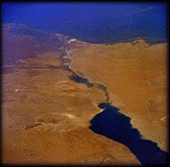 |
| The Suez canal. |
In military terms, the Anglo-Franco-Israeli force defeated the Egyptian army. The defeat for Britain and France came in the form of
international politics. By the time of the conflict neither country was the dominant power in the west, and pressure from the U.S. (due the fact that
Washington was unwilling to condone the Anglo-French actions while condemning the Soviet actions in Hungary) forced a UN ceasefire upon the region. The
conflict formed a turning point in world politics, no longer would Britain and France have a free reign around the world. The resignation of the then
British Prime Minister (Anthony Eden) and the level of propaganda in the British media against Nasser at the time of the crisis serves as a reminder that,
even in the post modern age of a western democracy, cynical manipulation of public opinion and conspiratorial international politics are still common.
The Suez crisis wasn't a war, merely a 'crisis'. British troops did win the battle, the conflict was lost in international diplomacy.
The first argument is just semantics, we could easily call the conflict 'The battle for the Suez canal'. The second argument has more validity, but Britain's loss was its credibility as an international superpower and control of the canal rather than a loss in terms of strict military casualties or territory gained.
Somme, 1916.
 |
| British troops in World war one. |
British troops gained some 10 miles of land from the Germans.
The argument comes down to whether victory can be at any cost or not. Anyone arguing that the British loss of life was worth those 10 miles of French land is standing on thin ice.
Afghanistan, 1842, 1880, 1919.
 |
| Afghanistan. |
The British never had any intention of conquering Afghanistan, merely pacifying it and preventing the Russians from influencing politics in the region.
True of course, but the British incursion into Afghanistan failed even in these objectives, stirring up Afghan tribes and over-estimating Russian interests in the area during the 1800s.
Gallipoli, 1915; Iraq, 1916.
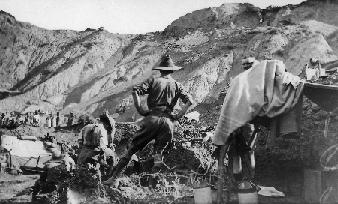 |
| Australian troops at Gallipoli. |
The British withdrew from the Dardanelles without being defeated.
Which means that the invasion failed in its objective to 'open up a new front'.
Isandhlwana, 1879.
 |
| The battle at Isandhlwana. |
Britain conquered the Zulu capital at Ulundi soon after the battle at Isandhlwana.
This is true, but it cannot paper over the cracks of the fact that an entire column of British troops were wiped out.
Castlebar, 1798.
The Irish rebellion of 1798 was, in some respects, fuelled and inspired by the successes of the French Bourgeois revolution of 1789. Ireland was under the control of London and in 1798 several large uprisings took place across the country; each one was ruthlessly crushed by the British army. The Irish rebels appealed to the French government for military aid (France and Britain were at war at the time) and in August several thousand French troops landed in Ireland. Joined by Irish irregular forces they fought the British at Castlebar. The British defeat at Castlebar became known as "The races at Castlebar" because of the ease with which the numerically superior British (accounts differ dramatically over the number of French and British troops that were at Castlebar. Patriotic Irish historians may well have massaged the figures over the years) routed from the battle after a Franco-Irish charge. There was always a certain unease in the alliance between the French and the Irish and the rebellion didn't last much longer as the British defeated the French force at the Battle of Ballinamuck (also in 1798).
Saratoga, 1777.
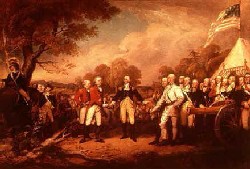 |
| The British surrender at Saratoga. |
Many of the troops at the battle were Germans or Americans fighting under the Union Jack, it was not a true British force.
This argument is irrelevant, a defeat is a defeat for any and all sides and allies involved in a battle. Besides, even if the British troops were born in the Americas they were still fighting for British interests in the region. Anyway, if you want to talk about the majority of the force not being British than we can always talk about Waterloo...
Yorktown, 1781.
The defeat of the British by the Americans and French at Yorktown was the battle that effectively won the US revolution for the Americans. After the British forces surrendered, following a lengthy siege of the city, the will of the British parliament to fight the war was totally broken. Within 2 years the British had signed an accord that recognised the existence of the United States as an independent nation.
British forces were commanded by Major General Cornwallis, a man who made several mistakes that lead to the defeat. The British army had been forced to retreat out of the Carolinas after a difficult campaign and was expecting to receive re-enforcements and supplies by seas along the river York. Camping out at Yorktown, the British inexplicably abandoned defensive positions and allowed the Franco-American force to take up positions around the town ideal for bombarding them with artillery. Within 2 months of the start of the siege, a British army of some 8000 soldiers surrendered to the Americans, this army constituted a full quarter of the troops loyal to the British crown in the Americas. Although the war did not officially end for the next two years, the war was won on this day. The British could not hope to prevent American independence given the lack of popular support for the war and the fact that international politics (war with France was a more important concern) loomed as a much greater concern in the mind of the nation.
Hastings, 1066.
Now before anyone starts calling a 'foul' on my list, I should point out the following: I know that the battle of Hastings wasn't fought between British troops and a foreign power, and that in fact it was more struggle between two individuals who both believed themselves to have (relatively spurious) claims on the English throne. The fact remains though that the majority of troops fighting for Harold (the ruling English monarch) were from England while the troops fighting for William (the Norman pretender to the throne) were from France. The difficulty in classing this as a defeat for the British or English is that the concept of the English nation state didn't exist at the time, indeed the people of what is now Cornwall or Cumbria had very little to do with the English crown at the time of the battle. What can be said is that the victory of the Normans at Hastings opened a new chapter in the history of the British Isles, i.e. the operation of the state and monarchy were changed forever while the English crown claimed ownership over lands in northern France for centuries to come. I therefore leave my discussion of the English defeat at Hastings as an open-ended question; without doubt the soldiers of England were defeated on that day, but whether one can truly class such a defeat as a British military loss is a question of semantics and conflicting historical viewpoints. I shall leave the readers to make up their own minds.
La Rochelle, 1372.
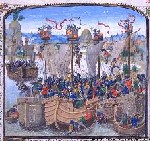 |
| The naval engagement at La Rochelle. |
Orleans, 1429.
 |
| A medieval portrait of Joan of Arc. |
An English relief force was defeated almost to a man despite also outnumbering the French led by Joan. Accounts of the battle once again speak of the French being supported by angels and having a divine leadership. These victories, combined with subsequent liberation of several French towns and cities by Joan, led to Joan of Arc being forever remembered as a heroine of France, her name and legend being equated with that of a saint or holy leader. She was captured and burned at the stake by the English in 1430.
Joan of Arc never lived to enjoy her victories, we killed her.
The fact that the leader of an army was eventually murdered cannot wipe out the victories that the army had. The English were defeated soundly at Orleans.
Bordeaux, 1453.
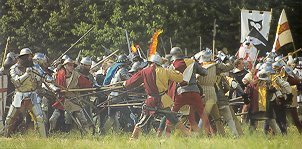 |
| A re-enactment of a battle between France and England in the Hundred years war. |
Medway, 1667.
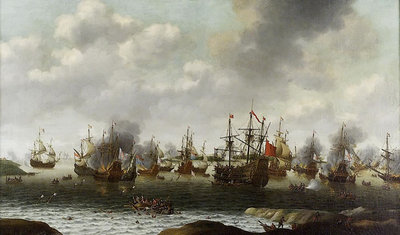 |
| The battle of Medway. |
The Dutch never actually conquered Britain. Who cares about loosing a couple of big ships anyway?
Well for a start they never would have been able to conquer Britain even if their fleet had landed in London, and that was never their objective anyway. Losing the flag ship was a big deal, the modern equivalent would be if someone sailed into a US naval base and stole an aircraft carrier.
The Hundred years war, 1337-1453.
We have already discussed the three most important English defeats of the Hundred years war. Something that is often, unforgivably so, overlooked by popular history and historical myth is the fact that the English lost the Hundred years war. With so much concentration on the English victories as Crecy (1346) and Agincourt (1415) (where the superiority of the English longbows over the French crossbows and knights signaled a new era in warfare) the ultimate English defeat in the war is occasionally forgotten. The historical roots of the conflict lie in the fact that the kings of France and English had identical heritages and therefore felt that each had a claim on the lands of the other, indeed this is one of the reasons why William the Conqueror saw himself as the rightful heir to the English throne in 1066 and Henry II (king of England 1154-1189) spoke mostly French as he was born and raised in France. The territory controlled by the English monarchs of this era often contained large portions of continental Europe in France. The war consisted of a series of set backs and victories for each side as well as a multitude of shifting alliances between the major and minor powers of Europe in the region. France and Spain were allied and supported the Scottish cause of independence from the English crown. England was allied with Portugal and Burgundy and controlled large sections of Aquitaine and northern France. Ultimately the war caused the solidification of England and France as nation states in the form that one might recognise them these days. Never again did England attempt to claim lands in continental Europe while finally France was united under one banner after centuries of division into independent provinces and fiefdoms. The war was one of the most important series of conflicts in the formation of nation states in western Europe, is was also a defeat for English interests in Europe. The English now turned their attentions to the New World and Africa to build an empire.
The US war of Independence, 1775-1783.
Quite how anyone could ignore this great British military defeat is beyond my comprehension. For several centuries before this conflict, the great Atlantic European powers (Britain, France, Holland, Spain and Portugal) had fought for control of shipping rights and territory in the New World. New York (originally New Amsterdam) was now a centre of British power in the Americas in terms of trade. When American rebels in Boston rose up against excessive British taxes during 1775 (now known as the Boston tea party) they could hardly have expected that within a year an independent American congress would have been formed and declared its independence from the British state. The British moved quickly to crush this threat, but several great thinkers and writers (amongst them Thomas Paine) inspired the rebels with an overwhelming sense that their cause was one of freedom and liberty. The American rebel army had many defeats in the early days of the war and had to adopt tactics which might now be seen as akin to guerrilla warfare (I'd love to say that they used terrorist tactics. Just to annoy Americans of course, but I wont). The great American victories often came by outmaneuvering the British forces and luring them into un-winnable situations. The longer the war drew on, the less of a stomach for a fight the British public had. Even though many of the troops fighting on the British side were German mercenaries the commanders were all from the British officer class. After the great US victory at Yorktown the French openly declared their support for the fledgling USA. This was the turning point of the war, international recognition and French aid as well as the British public lacking the stomach for another war with France meant that the British were placed in an un-winnable situation. This is, of course, very ironic in the light of the current deterioration in international relations between the USA and France.
Britain lost control of its colonies on the east coast of the Americas and was defeated by France (again) in international politics. Given the vast natural resources available to America and the power that the USA now holds, the British lost one of its most valuable assets in 1783 when it officially recognised the existence of the USA in the treaty of Paris.
The Battle of Cartegena de las Indias, 1741.
Over the years many people have read this article on British military defeats, over the years some have emailed me. Of those who have
emailed me, almost all have cited the battle of Cartenea de las Indias as one of Britain's biggest military defeats and are surprised by its absence in my
list. Ashamed as I am to say, the British education system and national predisposition to forget failures has bested me once again - for I had never heard
of this encounter before it being brought to my attention by my readers. I have since done my research, and for the uninitiated I shall provide a brief
history.
During the 18th century Britain and Spain were two of the world's foremost naval powers, naturally they were battling for control over the
lucrative colonies in the new world. Spain had control of the South Americas, Britain wanted a slice of the pie and so sent a fleet to the South Atlantic
with the intention of capturing the port of Cartegena de las Indias (now in Columbia). The British force outnumbered the Spanish by almost an order of
magnitude, yet were defeated after several months of bombardments, seiges, pitched battles and ship-to-ship combat. Fully one third of British troops were
killed during the conflict, which was characterised by bad command decisions and terrible diseases which plagued British forces. The result of this failure
is difficult to understate. Not only did Britain's position on the World and Eurpoean stage decline in the short term, but Spain's position of power in
Central and South America was firmly-entrenched to the point that its dominance was never challenged during the age of European Empires. A world in which
Britain succeeded at Cartegena de las Islas may have resulted in a South America which Spain and Britain controlled equally, resulting in a vastly different
19th and 20th centuries. Imagine a British Empire with South American nations at its heart, speaking English and perhaps with a lessened feeling of
brotherhood for their neighbouring nations. Such a world would likely result in a wildly different set of relations between North and South America and who
knows what else?
In Britain today people still make a fuss about the British victory over the Spanish Armada of 1588, however the Battle of Cartengena
de las Indias was fully 150 later and it is forgotten. Proves just how variable history can be.
Dean Wright, August 2009.
Home.